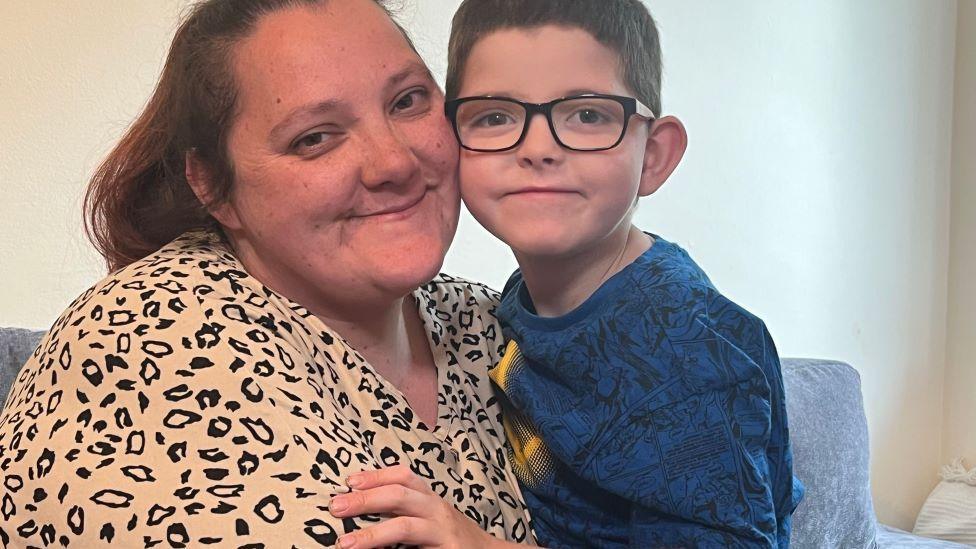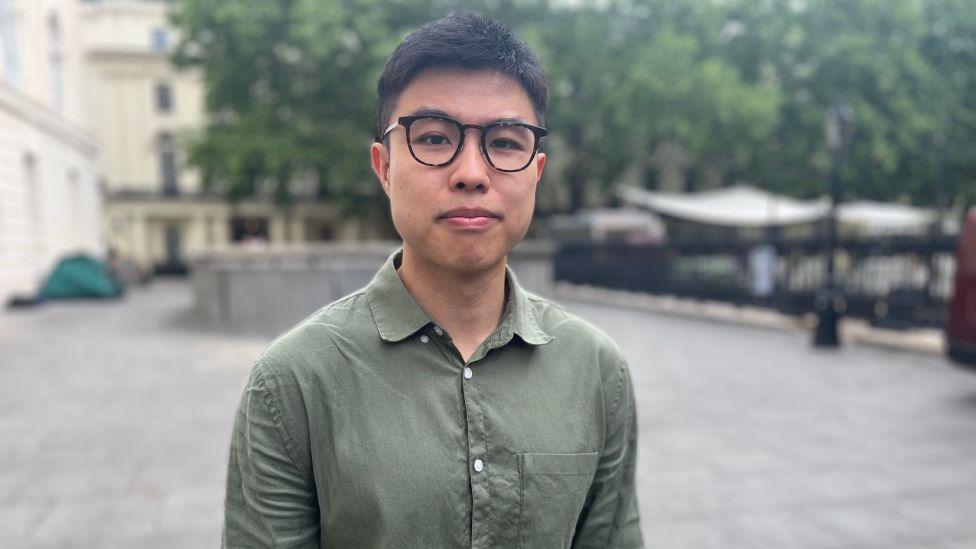A charity is giving people money to stop homelessness - and it says it's working

Laura Burns was given £600 by a charity when she needed to move flats
- Published
When Laura Burns was asked to leave her flat as her landlord was selling up, she discovered she didn't have enough money to move.
Energy debts and removal costs meant she needed hundreds of pounds to get a new flat.
Feeling trapped and facing eviction, the mother-of-one turned to a charity and asked for £600. The money came through almost instantly.
"I was like, 'oh my goodness', this is a weight off my mind," says the 32-year-old from Didcot, in Oxfordshire. "There are no words to describe leaving that stress behind."
Greater Change, the charity that helped Laura, believes giving money to people who are homeless or those at risk of losing their properties with few strings attached can help tackle homelessness. So far this year, it says the charity has paid out £699,000 to 403 people.
The initiative is small in scale – the homeless charity Shelter estimated there were more than 350,000 homeless people in England at the end of last year. But Greater Change says the scheme has the potential to save money in the long-run.
"We're giving people dignity of choice," says the charity's chief executive, Jonathan Tan. "Very often, in a homelessness pathway, it feels like it's things being done to you and so we're giving people the ability to make choices about their lives."

Greater Change CEO Jonathan Tan says the charity gives people the "dignity of choice"
The money is paid out through a support worker and the charity says it will listen to all requests for help. It says people typically spend the money on rent deposits, bills or tackling debts.
Greater Change, which was formed by two university friends in 2018, is funded from donations, philanthropists, grant-making bodies and councils. It says its approach saves taxpayers tens of thousands of pounds per client by preventing people from becoming homeless and therefore needing support from their local authority.
"We're happy to fund anything under the sun as long as it aligns with the individual's ambitions and helps them to take that next big step out of homelessness," says Mr Tan. The charity says 86% of people it has supported moved into stable housing, with almost half finding a job.
But one concern is homeless people could spend the money on feeding addictions.
Asked how the charity ensures the money it gives out isn't spent on drugs and alcohol, Mr Tan says: "The first and most important thing to say is the international evidence is that people tend to make pretty good choices."
He says almost half of those supported were able to get a job.
One of the studies he points to is the New Leaf project, in Vancouver, Canada. It gave 50 people who were homeless around £4,000 (CAD$7,500) each directly rather than via a support worker. It also monitored another 65 homeless people who they didn't help. A follow-up study, external showed that after a year, those who had received the money spent fewer days without a home. There was also no evidence that they had increased spending on things like drugs, alcohol and tobacco.
A smaller scale project in the UK has shown similar results. The Personal Grants project, which involved 81 people, led by the London-based St Martin-in-the-Fields charity working alongside organisations in Glasgow, Oxford and Swansea, paid money directly into the bank accounts of homeless people.
The Personal Grants project has not had "a single adverse incident among any participants", according to the Centre for Homelessness Impact, external, which also worked on the scheme. They say people spent the money on furniture, books, clothes or simply saved it. "None spent the money on drugs, alcohol, or gambling," say the Centre.
They are now recruiting 250 people in Belfast and London to test the concept on a larger scale, with the project overseen by researchers from Kings College, London.
A tent city next to Mayfair: Why cutting homelessness might be harder than before
- Published9 September 2024
Record number of 'homeless' children in England
- Published8 August 2024
London's 'spiralling' housing crisis in numbers
- Published4 May
Greater Change acknowledges that its support is most effective when it is used as an early intervention - when someone is sofa surfing, or at risk of homelessness - rather than for helping entrenched rough sleepers who might need intensive mental health support for instance. Various campaigns over the years have actively discouraged people from giving money to people on the streets, arguing the funds could be misused.
These projects also do not tackle the fundamental cause of most homelessness - there is a widespread acknowledgement that a lack of affordable housing is the key to solving the crisis and the government has committed to building 1.5m homes by August 2029. But the charity says such innovative schemes can be extremely helpful to some people.
Since receiving her grant, Laura Burns' life has been transformed – she now has a new home, a job and is about to get married. The money she received was the right help, at the right time. "I know you don't get much for £600 these days. But for me it was a life-saving amount of money. Life is now dandy."
Get in touch
Have you been affected by the issues raised in this story?